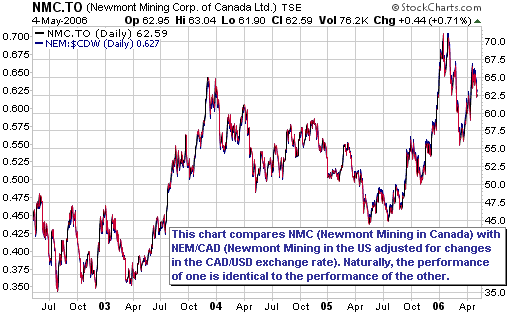|
|||
Can you profit from a falling US$ by buying resource shares on non-US exchanges?Steve Saville
There's a widely held opinion that you can take advantage of a weakening US$ by buying your resource shares outside the US; in Canada, for instance. We'll put aside, for a moment, our view that the US$ is more likely to rise than to fall over the coming 6-12 months and look at why this widely held opinion is logically flawed. First, let's consider the example of Newmont Mining, a stock that trades on several exchanges including the New York (NYSE) and Toronto (TSX) exchanges. Regardless of what happens to the CAD/USD exchange rate, a US investor who buys Newmont in Canada will not do any better or worse than one who buys it in the US because the price of the stock on each market will adjust to account for changes in the CAD/USD rate. For example, if the price of Newmont rises by 10% in Canada and the CAD rises by 10% against the USD then a US investor who buys the stock on the TSX will make 20% (10% from the price rise plus 10% from the exchange rate), but during the same period the price of NEM in the US will rise by 20% so someone who buys the stock on the NYSE will make exactly the same amount of profit. In fact, the US investor who bought the stock in the US would end up doing slightly better because he/she would avoid the currency conversion costs (the currency conversion will typically cost you about 1% on the buy and another 1% on the sell). The inability to gain (or lose) from exchange rate changes in the example described above is illustrated on the following chart. The chart compares Newmont Mining's performance in the US, adjusted for changes in the CAD/USD rate, with its performance in Canada. There are actually two lines on the chart, but it looks like there is just one line because both lines are in exactly the same place.  Many of our readers will consider the above to be a statement of the obvious, but it's amazing how many people think their results can be improved by buying a stock in terms of a currency that happens to be appreciating rather than buying the same stock in terms of a weak currency. But what about a resource stock that only trades in Canada? Could a US-based investor profit from an increase in the CAD/USD rate by buying such a stock? The answer is: it's not appropriate to generalise. If a strong currency provided an automatic benefit to equity investors then the shares of South African gold miners would have been the best gold stocks to own during 2003-2004 because the Rand was the strongest currency in the world during this period. However, they were actually the WORST stocks to own, largely BECAUSE the Rand was so strong. The reason the SA gold stocks performed so poorly during the aforementioned period is that these companies' costs were denominated in a strong currency whereas their revenues were denominated in a weak currency (gold trades internationally in US dollars). Because the SA Rand was appreciating at a faster rate than gold, the profit margins of SA-based gold producers FELL and the resultant fall in their stock prices was much greater than any benefit a US investor in these stocks would have received due to the gain in the Rand/US$ exchange rate. The key to profiting from exchange rate moves when investing in resource stocks isn't to buy the stocks whose prices are denominated in a strong currency, but, instead, to buy the stocks of mining companies whose COSTS are denominated in a WEAK currency. A company that sells gold in US dollars and incurs most of its costs in terms of a currency that is weakening relative to the US$ will get a dual boost to its profit margins in a rising metal price environment. There are many mining companies that incur most of their costs outside Canada even though they have their corporate headquarters in Canada and trade on the TSX/TSXV. The stocks of these companies have the potential to do particularly well in the face of a rising CAD, but the bottom line is that a stock's performance over the long-term will be determined by its actual and/or projected profits and not by the performance of the currency in which its shares happen to change hands. In the short-term almost anything can happen and when traders feel very optimistic about natural resources it's likely that most resource-oriented shares will surge, even the ones that could eventually be hampered by having their costs denominated in terms of a strong currency. On a related matter it's important to understand that when you buy a stock the currency you are exposed to isn't necessarily the currency that you happened to use to make your purchase. Rather, the assets of the underlying company will determine your currency exposure. For example, iShares Japan (EWJ) trades in US dollars on the American Stock Exchange, but someone who buys this stock ends up with a long position in the Japanese Yen, not the US$, because EWJ's assets are Yen-denominated. If, for instance, the prices of EWJ's assets were to remain the same while the Yen gained 10% against the US$ then the price of EWJ would rise by 10%. By the same token, when you buy gold bullion the currency you use to make the purchase is irrelevant because what you end up with, in all cases, is ounces of gold. Steve Saville Regular financial market forecasts and analyses are provided at our web site: We aren't offering a free trial subscription at this time, but free samples of our work (excerpts from our regular commentaries) can be viewed at: http://tsi-blog.com Saville Archives |
